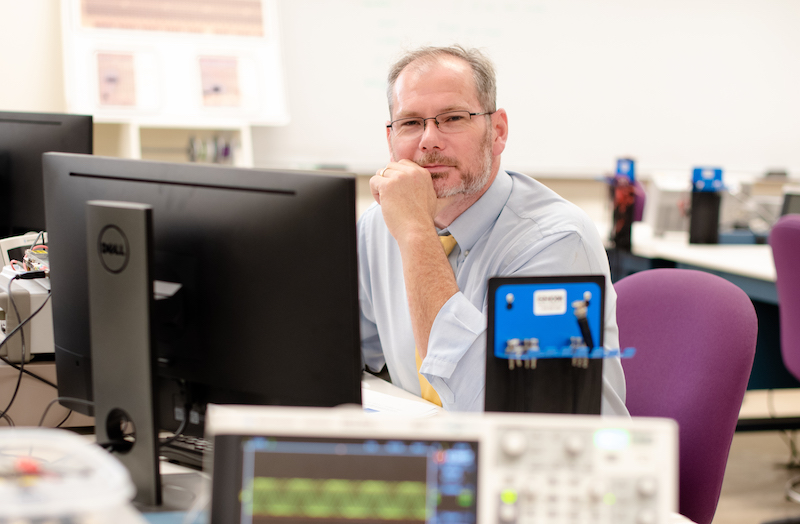
Electrical and Computer Engineering Professor Christopher Middlebrook was honored with an award from the Department of Defense for his efforts to educate the electronics manufacturing workforce’s next generation. His award was presented by Adele Radcliff, Director of the Department of Defense Industrial Base Analysis and Sustainment Program. He received the award on Wednesday, August 17, during the Future Electronics Workforce Summit held at Michigan Tech.
Last March, Prof. Middlebrook was selected for the Michigan Tech Dean’s Teaching Showcase, selected for growing his work with printed circuit board (PCB) design into something extraordinary. He recognized a training need for electronic design engineers and put all the pieces in place to address a national security problem and offer employment opportunities for Michigan Tech students.
Middlebrook’s involvement with the Institute for Printed Circuits (IPC), a trade association founded to standardize assembly and production of electronic equipment, led to an IPC student chapter being formed the Department of Electrical and Computer Engineering at Michigan Tech. His hard work was also instrumental in establishing the new Plexus Innovation Lab, an electronics makerspace, in Michigan Tech’s Electrical Energy Resources Center.
Middlebrook is a member of the IEEE, OSA, and SPIE. He was also an electrical engineer with the Electro-optics Division, NAVSEA Crane, where he served as a research test and development engineer. He earned a BS in Electrical Engineering at Michigan Tech, an MS in Optical Engineering at Rose Hulman Institute of Technology, and a PhD in Optics at the University of Central Florida. He joined Michigan Tech as an assistant professor in 2007.
Middlebrook’s research interests include visible and infrared imaging systems, integrated photonic devices, optical remote-sensing system design, and optical beam projection through atmospheric turbulence. His facilities on campus include include a 700-square-foot optical research and testing lab, as well as a 500-square-foot teaching optical lab. He also serves as the faculty advisor for the Optics and Photonics Society at Michigan Tech.
Read more about the Future Electronics Workforce Summit news coverage:
Future Electronics Workforce Summit held at MTU’s Rozsa Center, by Colin Jackson, WLUC-TV
MTU hosts summit on future electronics workforce, by Garett Neese, Daily Mining Gazette